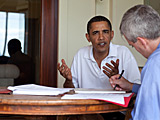Costs of War: Connecting the Clichés
By Shaun Waterman for ISN
Of all the clichés dragged out to describe and account for the failure of US agencies to put together the various pieces of information they had about the plot and its would-be perpetrator, none is more misleading than the phrase ‘connect the dots.’
President Barack Obama - after previously describing the breakdown in much less hackneyed terms - external pagelast week saidcall_made the US government had “failed to connect the dots in a way that would have prevented a known terrorist from boarding a plane for America.”
But - as the president surely understands - as a metaphor for the process of sifting and collating the huge stream of data that US spy agencies are now collecting about terrorist suspects and their associates, ‘connect the dots’ is fatally flawed.
The picture created is not pre-drawn, and it can change at any moment. Worst of all, there is a blizzard of ‘dots,’ many of them already connected to other dots in some way - and most of them probably more-or-less meaningless.
“The information available to analysts,” read last week’s White House review, “was, as is usually the case, fragmentary and embedded in a large volume of other data.” The point is not just finding connections, but figuring out what they mean, if anything.
external pageObama himself had earlier saidcall_made that “bits of information available [...] could have and should have been pieced together,” a more accurate - if less headline friendly - description of what went wrong.
Public opinion
The Republican Party attack machine used the near-miss to hammer home a charge that Obama’s administration is weak on terror - external pagecalling them in one fundraising appealcall_made “weak-kneed liberals” whose “efforts to weaken our national security” need to be opposed.
But a external pagenew poll this weekcall_made suggests these attacks have not shifted Americans’ views. Nearly two-thirds of respondents told a external pageCNN/Opinion Research Corporation surveycall_made that they had a moderate or great deal of confidence in the administration to protect them from future terrorist attacks - two points more than in August. Just over one-third said they had not much or no confidence, down a single point since the summer.
Republicans, of course, understand that in a low-turnout, off-year general election, like the one this November, motivating the party base is an important key to victory. So the fact that 55 percent of independents, and 57 percent of all Americans, approve of the way the president handled the failed attack, may not matter so much to them.
Panel mania
On Capitol Hill, lawmakers of both parties seem determined to launch the usual over-lapping plethora of congressional investigations. According to Congressional Quarterly last week, there were already five different House and Senate committees looking into the way various US agencies’ procedures operated - or didn’t - after the would-be bomber’s father reported his radicalization to the US Embassy in Nigeria and the CIA concluded he had probably gone to Yemen.
“More panels may yet get involved,” predicted CQ, but the partisan tone being set so far suggests that these multiple probes - in their public hearings at least - will likely devolve into a bitter brew of bickering and grandstanding.
The prospect that officials charged with actually running the nation’s counterterrorism efforts might get tied up for days by multiple and repetitive briefings for congressional committees with over-lapping jurisdictions was what prompted the 9/11 Commission to recommend a thorough overhaul and centralization of oversight.
At the same time, in another danger the commission warned of, many of the administration’s nominees for key security posts remain mired in partisan disputes in the Senate - including the heads of the three Department of Homeland Security agencies, which were at the center of recent events: US Customs and Border Protection, the Transportation Security Administration and the Office of Intelligence and Analysis.
Bungling oversight
Yet somehow, despite the multiple overhauls by Congress of other parts of government in line - in most cases - with the 9/11 commission’s proposals, lawmakers have never found the time or energy to deal with the flaws the commission identified in their own operation.
The dangers the commission identified in the way Congress was bungling its oversight and even legislative duties in the wake of the 9/11 attacks are no longer hypothetical.
President Obama accepted responsibility for the failures that left a heroic Dutchman and his fellow passengers the last line of defense against al-Qaida, but perhaps he should not have.
What failed, the White House review found, was “all-source analysis” and fusion of intelligence information available to US agencies - inevitably, it was a failure to “connect the dots.”
The review also found that there was no clear responsibility for tracking priority terror threats, and that the strategic focus of US counterterrorism efforts against al-Qaida’s franchise in Yemen had been on threats against US interests there, rather than the homeland.
Fixing exactly these problems was at the heart of the intelligence reform overhaul that Congress initiated in response to the 9/11 Commission report. Lawmakers created the National Counter-Terrorism Center precisely to do all-source analysis on terror threats, including the watch-listing of suspected terrorists; and ensure that priority threats did not “fall between the cracks” - another metaphor which may be less useful than it seems.
The Center was in many ways the jewel in the crown of the Intelligence Reform and Terrorism Prevention Act of 2004. Lawmakers - from several different committees, naturally - have closely followed the center’s progress
If the NCTC has failed, Congress has failed.

